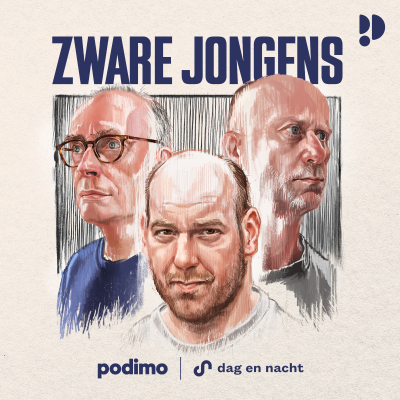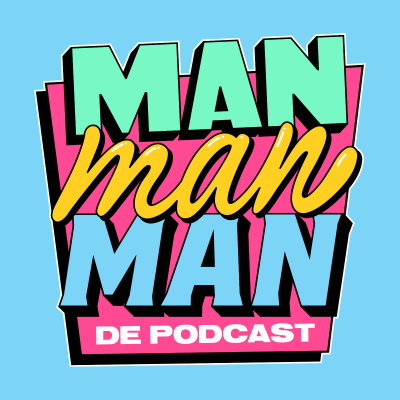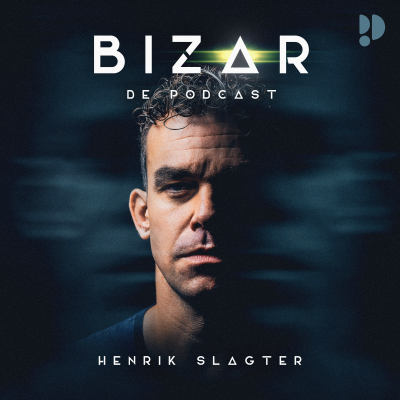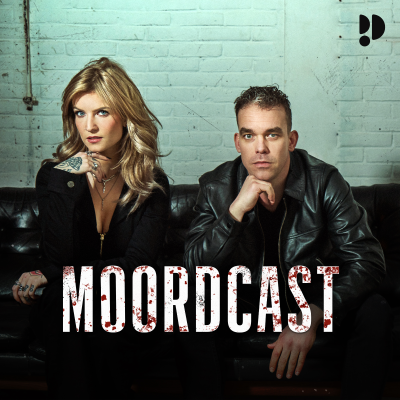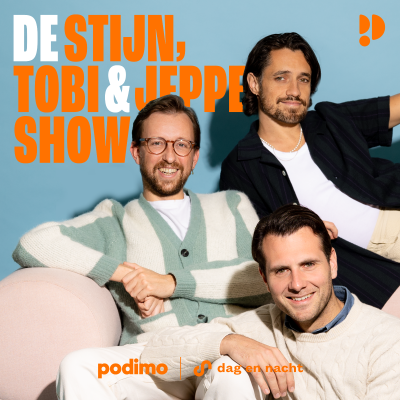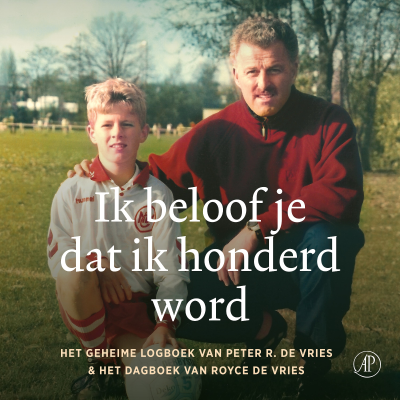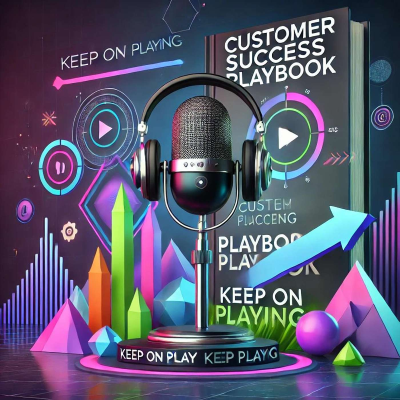
The Customer Success Playbook
Podcast door Kevin Metzger and Roman Trebon
Welcome to “The Customer Success Playbook,” a fresh podcast initiative spearheaded by Kevin Metzger and Roman Trebon. Immerse yourself with us in the dynamic realm of customer success, where we unravel the latest insights, inspirations, and wisdom from recognized leaders in the Customer Success domain.Our journey began with a simple yet profound belief: that meaningful conversations can significantly impact our professional trajectory. With this ethos, we’ve embarked on a mission to bring to you the voices of seasoned and revered professionals in the field. Our episodes have seen the likes of Sue Nabeth Moore, Greg Daines, Jeff Heclker, James Scott, David Ellin, and David Jackson, who have generously shared their expertise on a variety of pertinent topics.We’ve delved into the intricacies of Profit and Loss Statements in Customer Success with Dave Jacksson, explored the potential of Customer Success Platforms with Dave Ellin, and unravelled the role of AI in Customer Success with all guests. With Sue, we navigated the waters of Organizational Alignment, while Greg brought to light strategies for Reducing Churn. Not to be missed is James insightful discourse on the Current Trends in Customer Success and Jeff’s thoughts on Service Delivery in CS.Each episode is crafted with the intention to ignite curiosity and foster a culture of continuous learning and improvement among customer success professionals. Our discussions transcend the conventional, probing into the proactive approach, and the evolving landscape of customer success.Whether you’re a seasoned veteran or a newcomer to the industry, our goal is to propel your customer success prowess to greater heights. The rich tapestry of topics we cover ensures there’s something for everyone, from the fundamentals to the advanced strategies that shape the modern customer success playbook.Our upcoming episodes promise a wealth of knowledge with topics like CS Math, Training, AI, Getting hired in CS, and CS Tool reviews, ensuring our listeners stay ahead of the curve in this fast-evolving field. The roadmap ahead is laden with engaging dialogues with yet more industry mavens, aimed at equipping you with the acumen to excel in your customer success journey.At “The Customer Success Playbook,” our zeal for aiding others and disseminating our expertise to the community fuels our endeavor. Embark on this enlightening voyage with us, and escalate your customer success game to unparalleled levels.Join us on this quest for knowledge, engage with a community of like-minded professionals, and elevate your customer success game to the next level. Your journey towards mastering customer success begins here, at “The Customer Success Playbook.” Keep On Playing!!
Tijdelijke aanbieding
3 maanden voor € 0,99
Daarna € 9,99 / maandElk moment opzegbaar.
Alle afleveringen
138 afleveringenSend us a text [https://www.buzzsprout.com/twilio/text_messages/2161299/open_sms] The future of AI isn't just about technology—it's about relationships. Jake McKee, renowned as "the community guy," delivers a paradigm-shifting perspective on AI adoption that goes far beyond features and functionality. Rather than getting caught up in the technical capabilities, McKee advocates for designing the emotional connection between humans and AI systems. This customer success playbook episode reveals why the most successful AI implementations focus on relationship design, helping users feel comfortable whether they're interacting with a clearly identified robot or a humanistic assistant. McKee draws from his extensive experience at Lego and Fortune 500 companies to demonstrate how thoughtful AI experience design can transform user adoption and trust. Detailed Analysis McKee's revolutionary concept of "AI Experience Design" (AIX) represents a fundamental shift in how organizations should approach AI implementation. His core principle—"design the relationship, not the functionality"—challenges the prevailing rush to launch AI features without considering the human emotional experience. The discussion reveals critical insights about user psychology, particularly how people naturally anthropomorphize AI systems, using phrases like "please" and "thank you" even when they know they're communicating with machines. The conversation explores the delicate balance between AI enthusiasm and appropriateness, referencing recent challenges with overly enthusiastic AI responses. McKee emphasizes that successful AI relationships require the same nuanced understanding we apply to human interactions—matching energy levels, providing appropriate friction for creative processes, and recognizing when users need quick answers versus thoughtful collaboration. Perhaps most importantly, this customer success playbook demonstrates how AI transformation requires understanding context and purpose. A customer service agent dealing with frustrated callers needs rapid, efficient AI assistance, while a creative professional benefits from AI that provides "good friction"—intentional slowdowns that prompt deeper thinking rather than overwhelming users with instant responses. This strategic approach to AI experience design ensures technology serves human needs rather than creating additional complexity. Now you can interact with us directly by leaving a voice message at https://www.speakpipe.com/CustomerSuccessPlaybook [https://www.speakpipe.com/CustomerSuccessPlaybook] Kevin's offering Please Like, Comment, Share and Subscribe. You can also find the CS Playbook Podcast: YouTube - @CustomerSuccessPlaybookPodcast [https://youtube.com/channel/UCL_YffbeJ4xBhdqo9VRhHog] Twitter - @CS_Playbook [https://twitter.com/CS_Playbook] You can find Kevin at: Metzgerbusiness.com [http://www.metzgerbusiness.com] - Kevin's person web site Kevin Metzger on Linked In. [https://www.linkedin.com/in/kevinmetzger/] You can find Roman at: Roman Trebon on Linked In. [https://www.linkedin.com/in/roman-trebon/]
Send us a text [https://www.buzzsprout.com/twilio/text_messages/2161299/open_sms] AI Friday delivers cutting-edge insights as John Huber reveals how artificial intelligence is transforming customer success operations. The conversation explores practical AI applications that are already delivering results, from conversation intelligence tools like Chorus for team coaching and customer context gathering, to emerging platforms like Sturdy that analyze unstructured data across email, Slack, and support tickets to identify churn risks and expansion opportunities. John challenges the overhyped notion that AI will replace CSMs, emphasizing instead how it amplifies human capabilities and enables more strategic engagement. The discussion culminates with an intriguing experiment: using custom GPTs for renewal pricing strategy that combines deal structure recommendations with benefit articulation. This customer success playbook episode demonstrates how forward-thinking CS leaders are leveraging AI to scale their impact while maintaining the human connections that drive customer loyalty. Detailed Analysis The episode showcases a mature understanding of AI implementation in customer success, moving beyond theoretical possibilities to practical applications with measurable business impact. John's progression from early adoption of Chorus to exploration of comprehensive platforms like Sturdy illustrates the rapid evolution of AI tools specifically designed for CS operations. The discussion of unstructured data analysis represents a significant leap forward in customer intelligence capabilities. Traditional CS platforms focus primarily on structured data points, but John's experience with AI-powered analysis of emails, support tickets, and communication channels opens new possibilities for early risk detection and opportunity identification. This capability addresses a long-standing challenge in customer success: the inability to systematically analyze the vast amount of unstructured communication that contains critical insights about customer health and growth potential. John's perspective on AI replacing CSMs demonstrates thoughtful leadership in an era of technological disruption. His emphasis on AI as an enabler rather than a replacement aligns with successful digital transformation strategies across industries. The human element remains crucial for building trust, navigating complex customer relationships, and making nuanced decisions that require emotional intelligence. The custom GPT experiment for renewal pricing represents the frontier of AI applications in CS operations. This use case demonstrates how AI can be trained on specific business contexts to provide both analytical recommendations and strategic guidance, potentially transforming how CS teams approach contract negotiations and renewal conversations. For CS leaders, this episode provides a roadmap for AI adoption that balances innovation with practical implementation, emphasizing tools that enhance rather than replace human capabilities. Now you can interact with us directly by leaving a voice message at https://www.speakpipe.com/CustomerSuccessPlaybook [https://www.speakpipe.com/CustomerSuccessPlaybook] Please Like, Comment, Share and Subscribe. You can also find the CS Playbook Podcast: YouTube - @CustomerSuccessPlaybookPodcast [https://youtube.com/channel/UCL_YffbeJ4xBhdqo9VRhHog] Twitter - @CS_Playbook [https://twitter.com/CS_Playbook] You can find Kevin at: Metzgerbusiness.com [http://www.metzgerbusiness.com] - Kevin's person web site Kevin Metzger on Linked In. [https://www.linkedin.com/in/kevinmetzger/] You can find Roman at: Roman Trebon on Linked In. [https://www.linkedin.com/in/roman-trebon/]
Send us a text [https://www.buzzsprout.com/twilio/text_messages/2161299/open_sms] Wednesday brings the burning question that divides CS and sales teams everywhere: who should own expansion revenue? John Huber tackles this contentious topic with nuanced insights drawn from his experience managing both dedicated CS-led expansion models and hybrid partnership approaches. Rather than offering a one-size-fits-all answer, John presents a thoughtful framework for determining the optimal structure based on deal complexity, sales cycle length, and organizational maturity. He shares specific examples of successful implementations, including a sophisticated model where CSMs handled straightforward upsells and renewals while account executives managed complex expansion opportunities. The discussion dives deep into compensation structures, forecasting methodologies, and the critical importance of clearly defining roles to avoid territorial conflicts. This customer success playbook episode provides practical guidance for leaders struggling to optimize their expansion strategy without sacrificing customer relationships. Detailed Analysis This episode addresses one of the most politically charged topics in revenue operations: expansion ownership. John's approach demonstrates sophisticated thinking about organizational design, moving beyond simple "CS versus Sales" debates to examine the underlying factors that should drive structural decisions. The hybrid model John describes represents an evolution in CS thinking, recognizing that different types of expansion opportunities require different skill sets and engagement approaches. His 70/30 compensation structure (70% quota-oriented, 30% experience-focused) within the variable component offers a practical framework for balancing commercial accountability with customer-centric behaviors. Particularly valuable is John's emphasis on forecasting churn and renewal business with the same rigor as new logo acquisition. His practice of conducting detailed risk assessments 4-5 months before fiscal year start demonstrates the proactive mindset required for successful renewal management. The recommendation to begin renewal conversations 12 months in advance challenges the reactive approach many organizations take to customer retention. The discussion also highlights the importance of cross-functional partnerships, especially between CS and finance teams, in developing accurate forecasting models. John's collaborative approach with his CFO shows how CS leaders can elevate their strategic influence by speaking the language of business operations. For revenue leaders, this episode provides a decision-making framework for expansion ownership that considers deal complexity, resource allocation, and organizational capabilities rather than defaulting to territorial thinking. Now you can interact with us directly by leaving a voice message at https://www.speakpipe.com/CustomerSuccessPlaybook [https://www.speakpipe.com/CustomerSuccessPlaybook] Please Like, Comment, Share and Subscribe. You can also find the CS Playbook Podcast: YouTube - @CustomerSuccessPlaybookPodcast [https://youtube.com/channel/UCL_YffbeJ4xBhdqo9VRhHog] Twitter - @CS_Playbook [https://twitter.com/CS_Playbook] You can find Kevin at: Metzgerbusiness.com [http://www.metzgerbusiness.com] - Kevin's person web site Kevin Metzger on Linked In. [https://www.linkedin.com/in/kevinmetzger/] You can find Roman at: Roman Trebon on Linked In. [https://www.linkedin.com/in/roman-trebon/]
Send us a text [https://www.buzzsprout.com/twilio/text_messages/2161299/open_sms] Summary This episode kicks off a compelling three-part series featuring John Huber, founder of Customer Success Architects, who brings two decades of experience building CS functions across five different SaaS companies. The conversation centers on the fundamental question every growing business faces: how do you launch a customer success function that actually drives results? John shares his battle-tested approach, emphasizing the critical importance of aligning CS initiatives with company-wide strategic objectives rather than jumping straight into tactical execution. Through a fascinating case study involving a massive platform transformation for enterprise pharmaceutical and high-tech manufacturing clients, he demonstrates how proper alignment enabled a successful four-and-a-half-year migration from on-premise to cloud infrastructure without losing a single customer. This customer success playbook episode provides essential groundwork for any organization looking to build or rebuild their CS foundation. Detailed Analysis The discussion reveals several strategic insights that challenge conventional CS wisdom. Rather than immediately focusing on hiring CSMs or implementing technology platforms, John advocates for a "strategy-first" approach that ensures every CS initiative ladders up to broader business objectives. This methodology becomes particularly powerful when managing complex transformational projects, as evidenced by his experience migrating enterprise clients from legacy on-premise systems to modern cloud platforms. The episode highlights three critical success factors for new CS functions: strategic alignment with three-year company vision, cross-functional collaboration (especially with legal and finance teams), and allowing significantly more time than initially estimated for complex transitions. John's approach to contractual restructuring during platform migrations offers valuable lessons for companies navigating similar transformations, particularly the importance of providing financial incentives and flexible contract structures during transition periods. The conversation also underscores how customer success professionals must evolve beyond traditional support roles to become strategic business partners. John's team successfully positioned platform limitations as innovation opportunities, demonstrating the communication skills necessary to maintain customer relationships during potentially disruptive changes. For CS leaders and executives, this episode provides a practical framework for launching CS initiatives that deliver measurable business impact while maintaining strong customer relationships throughout complex organizational changes. Now you can interact with us directly by leaving a voice message at https://www.speakpipe.com/CustomerSuccessPlaybook [https://www.speakpipe.com/CustomerSuccessPlaybook] Please Like, Comment, Share and Subscribe. You can also find the CS Playbook Podcast: YouTube - @CustomerSuccessPlaybookPodcast [https://youtube.com/channel/UCL_YffbeJ4xBhdqo9VRhHog] Twitter - @CS_Playbook [https://twitter.com/CS_Playbook] You can find Kevin at: Metzgerbusiness.com [http://www.metzgerbusiness.com] - Kevin's person web site Kevin Metzger on Linked In. [https://www.linkedin.com/in/kevinmetzger/] You can find Roman at: Roman Trebon on Linked In. [https://www.linkedin.com/in/roman-trebon/]
Send us a text [https://www.buzzsprout.com/twilio/text_messages/2161299/open_sms] The Customer Success Playbook podcast wraps up its enlightening three-part series with Kristen Nolan of Interview Valet by exploring the delicate balance between technology and human connection. In this forward-thinking discussion, Kristen reveals how she leverages AI as a strategic tool while maintaining authentic relationships. From using AI to identify unique client differentiators to employing dictation for efficiency, this episode offers practical ways to harness technology without sacrificing the personal touch. Hosts Roman Trebon and Kevin Metzger guide a conversation that demonstrates how AI can enhance rather than replace meaningful connections in customer success. Detailed Analysis As AI continues to transform business operations, customer success professionals face a critical question: Can technology actually strengthen human relationships rather than diminish them? This episode provides a refreshingly balanced perspective that avoids both technological evangelism and fearful resistance. Kristen Nolan's approach to integrating AI into client relationships stands out for its pragmatism and strategic focus. Working at Interview Valet, where "relationships are the ultimate currency" serves as a core value, Kristen has developed a methodology that leverages AI as a starting point rather than an end solution. Her process of using tools like ChatGPT to identify a client's unique differentiators demonstrates how AI can enhance relationship-building by providing deeper insights that might otherwise remain undiscovered. What makes this discussion particularly valuable for the customer success playbook is the emphasis on maintaining authenticity while embracing technological efficiency. Kristen's guidance on viewing AI outputs as "a baseline" that requires human refinement offers a practical middle path for CS professionals concerned about sounding robotic or inauthentic in client communications. As she notes, "AI can't make up personal stories for you," highlighting the irreplaceable value of human experience in building genuine connections. The hosts share equally practical applications, with Roman revealing how he uses AI to improve the tone and client-centricity of his communications—not by blindly copying AI outputs, but by using them as a mirror to recognize when his natural communication style might come across as too abrupt. This application addresses one of the most common challenges in customer success: ensuring that necessary direct communications don't damage valuable relationships. For customer success teams looking to scale their operations without sacrificing quality, this episode provides a framework for thoughtful AI integration. The discussion moves beyond theoretical benefits to share tangible techniques like using ChatGPT projects to maintain context, leveraging dictation for efficiency, and using AI to help craft more concise communications. These practical tips demonstrate how technology can free up time for meaningful relationship-building rather than replacing it. Now you can interact with us directly by leaving a voice message at https://www.speakpipe.com/Cu [https://www.speakpipe.com/CustomerSuccessPlaybook] Please Like, Comment, Share and Subscribe. You can also find the CS Playbook Podcast: YouTube - @CustomerSuccessPlaybookPodcast [https://youtube.com/channel/UCL_YffbeJ4xBhdqo9VRhHog] Twitter - @CS_Playbook [https://twitter.com/CS_Playbook] You can find Kevin at: Metzgerbusiness.com [http://www.metzgerbusiness.com] - Kevin's person web site Kevin Metzger on Linked In. [https://www.linkedin.com/in/kevinmetzger/] You can find Roman at: Roman Trebon on Linked In. [https://www.linkedin.com/in/roman-trebon/]
Tijdelijke aanbieding
3 maanden voor € 0,99
Daarna € 9,99 / maandElk moment opzegbaar.
Exclusieve podcasts
Advertentievrij
Gratis podcasts
Luisterboeken
20 uur / maand
